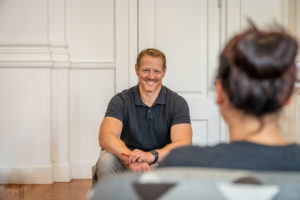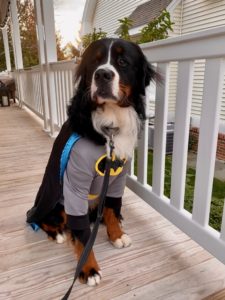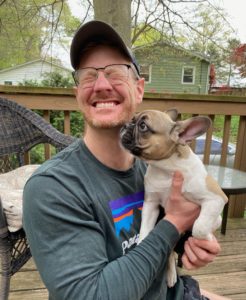About Me
My Experiences with Counseling

Early in high school, I was upset all the time and didn’t know what to do. I had asked my parents to find someone for me to talk to and they did.
I remember the look of disinterest on the face of the first professional I met with. At one meeting he simply played a VHS about anger then left the room.
There was no therapeutic benefit to this counseling relationship. But, I carry it with me so that it can benefit others. I know what it’s like to feel ignored and disregarded. I will always want people I meet with to feel acknowledged, listened to, and encouraged when we meet.
I later received counseling in my 20’s and 30’s for many years. I attribute that therapy to saving and improving my life. It reaffirmed that therapy is helpful and can reduce emotional and psychological problems.
College
My undergraduate degree in psychology led to a master’s degree in school counseling and eventually a post master’s certificate in marriage and family counseling. I loved the broad range of topics psychology covered. Everything from artificial intelligence to workplace efficiency to neuroscience sat before me. A true smorgasbord of topics. From this assortment, I caught myself going back for seconds around topics of cognitive behavioral therapy and philosophy.
While in college I worked as a lifeguard and as a lab tech. The jobs offered an interesting contrast. Observing and interacting with people on one hand, carefully following procedures and understanding data on the other offered contrasting experience and rewards.
Keeping up with the field of counseling’s emerging research while paying close attention to the emotional experience of a counseling session is very satisfying work.
Early Career
While in graduate school I began work at a dual diagnosis inpatient facility and work as a counseling intern at an elementary school. This work was the beginning of a trend throughout my career; one foot in a public school while holding an additional job in community based mental health counseling. These two jobs evolved into work as a middle school counselor, a behavior specialist consultant, a program specialist for a foster care agency, and private practice.
Across settings with my part time work, coworkers would always ask “why do you do it?” Without thinking, my answer was always “because I like it.” On my drive home, I’d think about this answer. It didn’t feel right. It was only partially true. I actually loved this work.
Listening to people, walking beside them as they sort things out and offering encouragement is a privilege that I feel fortunate and honored to do.
Being able to do it across settings- in a school, an office, and in people’s homes- only enriched and informed my work across settings.
Tragedies and A Change In Thinking
Work as a school counselor has been intriguing and rewarding for the same reason studying psychology was- its breadth. Although themes emerged in the problems of my students and their families, there would always be a new flavor of it and an exciting new approach to try. Both problems and solutions can evolve.
Like the venerable family therapist Virginia Satire, there was an aspect that caught my eye and ear frequently; teens can transform (sometimes dramatically) based on who was in the room. By extension, progress I made by meeting with a child in foster care or a student in a school, could be instantly undone when they left my office and encountered family members or friends (a sort of pseudo family). It was hard to help someone be the best version of themselves when “themself” was so malleable and surrounded by such strong influences. Working with an individual and their support system seems to be the most helpful and effective approach.
When I began incorporating more people into my meetings with teens, I began seeing progress accelerate and sustain. Some evenings I would have trouble falling asleep at night because I was so excited over how helpful people told me this work was.
Sadly, tragedy runs through the fields of education and human service as if it were stitches in a hem. It’s always there. One just has to take a look to find it. For me, 2019 brought a series of tragedies related to overdoses and suicides. Part of my way of coping was to consume as much educational material as possible. This brought me to a Prevent Suicide PA’s annual conference and a life changing presentation from Dr. Guy Diamond and his graduate cohort about Attachment Based Family Therapy. This model, which has been proven to be the best evidence based practice at reducing teen suicide and depression, crystalized my intuitions about change as it relates to a person within a system that needs to change. You can read more about Attachment Based Family Therapy here or why I like it here.
What Lies Ahead
I LOVE when podcasters ask their guests “what topic could you speak about for thirty minutes unprepared?”
My answer is “family therapy” and I once did it for three and a half hours with minimal prep for a graduate class. Students gave rave reviews on my performance too.
I am excited to succeed and fail on my own terms and pursue work with individuals and families full time in a private setting. I want to continue to focus on helping people in a specified way that can only be afforded to me through private practice- complete with safeguards for my clients, but far removed from bureaucracy.
If you think we could do good work together, I’d love to hear from you. Contact me here.
Education
- Post Graduate Certificate in Marriage and Family Therapy, Shippensburg University, 2012
- M. Ed in School Counseling, Shippensburg University, 2007
Certifications
- Licensed Professional Counselor (LPC), PC006904 (2012-Current)
- Nationally Certified Counselor(NCC), 232410 (2008-Current)
Odds and Ends
- Level II Attachment Based Family Therapy Certified
- Owner of two dogs (Jimmy and his daughter Gertrude)
- Volunteer work with A Haven and Natlands
About My Approach
Being genuine, honest, competent, and believing in the process of therapy produces the best outcomes.
In our work together I will strive to honor the valuable stories that make up your life. For treatment of symptoms related to depression and anxiety, my work utilizes concepts from the fields of Cognitive Behavioral Therapy, Dialectic Behavioral Therapy, narrative therapy, and Attachment Based Family Therapy (ABFT).
I believe that the most impactful and longest lasting change happens when all members of a system make changes together. Attachment Based Family Therapy focuses on just that. I encourage all of my teenage clients who are struggling with depression and anxiety to consider allowing us to work with other family members on their ability to attend to their relationship and build trust.

